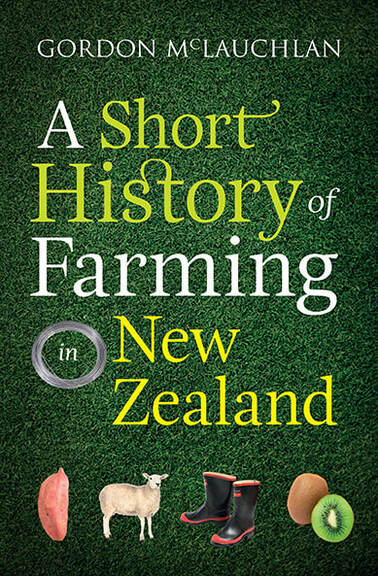
by Gordon McLauchlan
This is a rather curious book, a short history on a rather big subject. The late Gordon McLauchlan has also written short histories on bigger subjects, this is something of a series, but it seems more of a challenge. One may think there’s been plenty of writing on farming in New Zealand, but there has been very little of note by historians who aren’t specialists, and ‘agricultural’ historians don’t exist.
McLauchlan was also more of a journalist writing history than academically-trained: this is a strength, but also a weakness in this book. The author can make a good point very concisely, but also prefers to insert very long quotes without any referencing, something a professional historian would not do. The subject matter is much broader than just pastoral farming, as even former pests like deer get a chapter, as well one on horticulture. There are still quite a few chapters on sheep and dairy farming, but with no real structure in terms of chronology. The reader will get to chapter 10 and still find the author discussing the meaning of land settlement, as it was understood in the 19th century.
One of the strengths of the book is that McLauchlan does not shy away from the environmental destruction of bush clearance, especially in the North Island, and the many failures that happened for aspiring farmers on small blocks of uncleared land. The clearing of bush also involved fire and created a stark landscape that really was an environmental disaster, even if the family farm was viable economically. There is no a sense of the ‘booster’ here, a narrow view of land settlement.
While a lot of the detail about farming, and especially trade policies, seems familiar, some of the detail is quirky. I was not familiar with the so-called ‘remittance’ men who were 19th century migrants from Britain, usually recalcitrant aristocrats with an alcohol issue, who did some casual labouring, but relied on money coming from ‘home’. The whole idea of Britain as ‘Home’ is played out here over a number of chapters, as almost all our export trade went on ‘home boats’, until Britain joined the European trading block. The politics of this has already become a cliché.
McLauchlan obviously specialised in narrative history, but as the book goes on he adds more literary allusions, and somewhat odd metaphors. He refers to the UK and EEC relationship as a marriage, which made the New Zealand farmer the “mistress of the British food business.” This somewhat dodgy metaphor continues in the next paragraph, as the jilted mistress tries to ply her wares to other customers, a rather odd way to describe ‘diversification’ and ‘restructuring’ in the 1980s. A similar thing happens in the next chapter with an odd quote attributed to John Ruskin, which compares the colonised Indian people to the Scottish, the kind of settlers found in the South Island.
Another aspect of the narrative in this book is the need to repeat a lot of statistics, and numerical proportions. For some reason McLauchlan can’t bring himself to use the % symbol, so writes in ‘per cent’ every time. Indeed, there are no tables of figures or graphs at all in the whole book, which makes the text a bit monotonous. There are no illustrations or photographs either. So, while it is a well-designed book, it is all text, and something that only Gordon McLauchlan could have written.
Title: A Short History of Farming in New Zealand
Author: Gordon McLauchlan
Publisher: Bateman
ISBN: 978-1-98-853801-3
RRP: $29.99
Available: bookshops

 RSS Feed
RSS Feed
